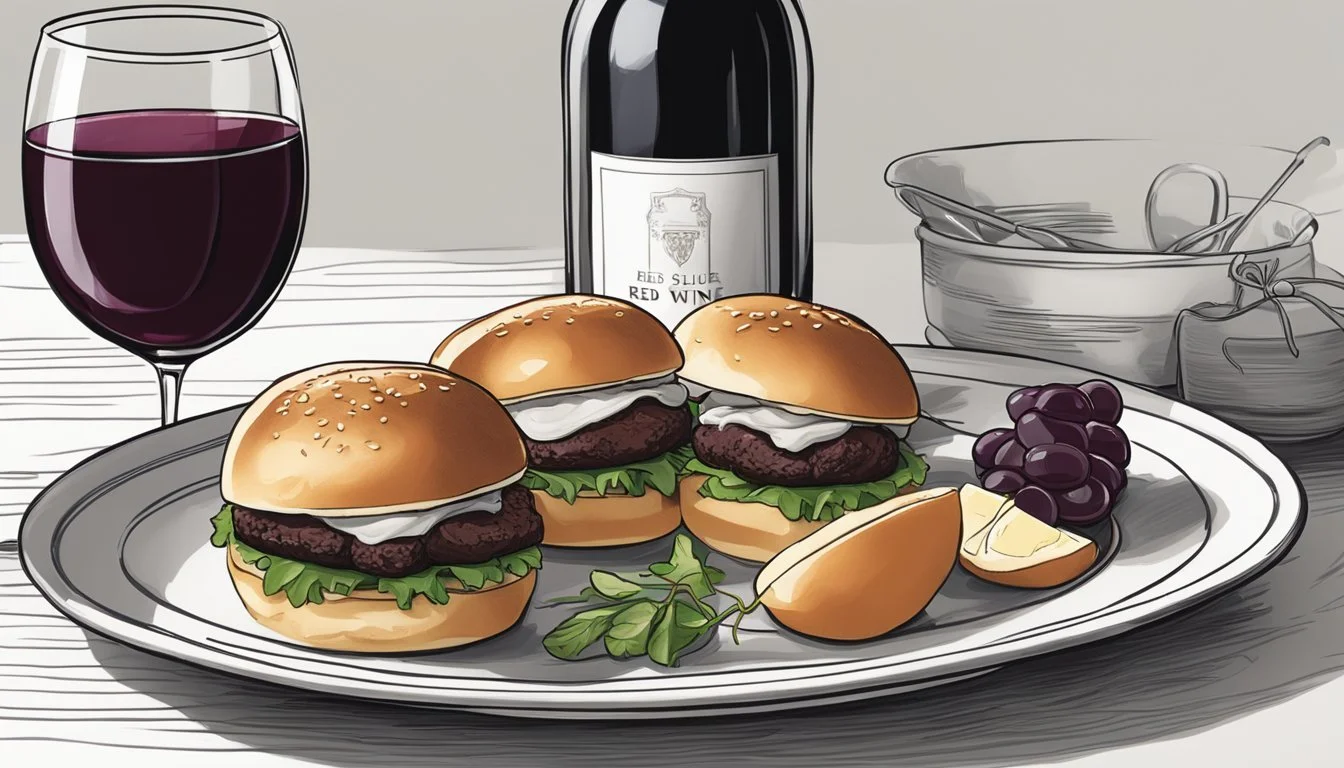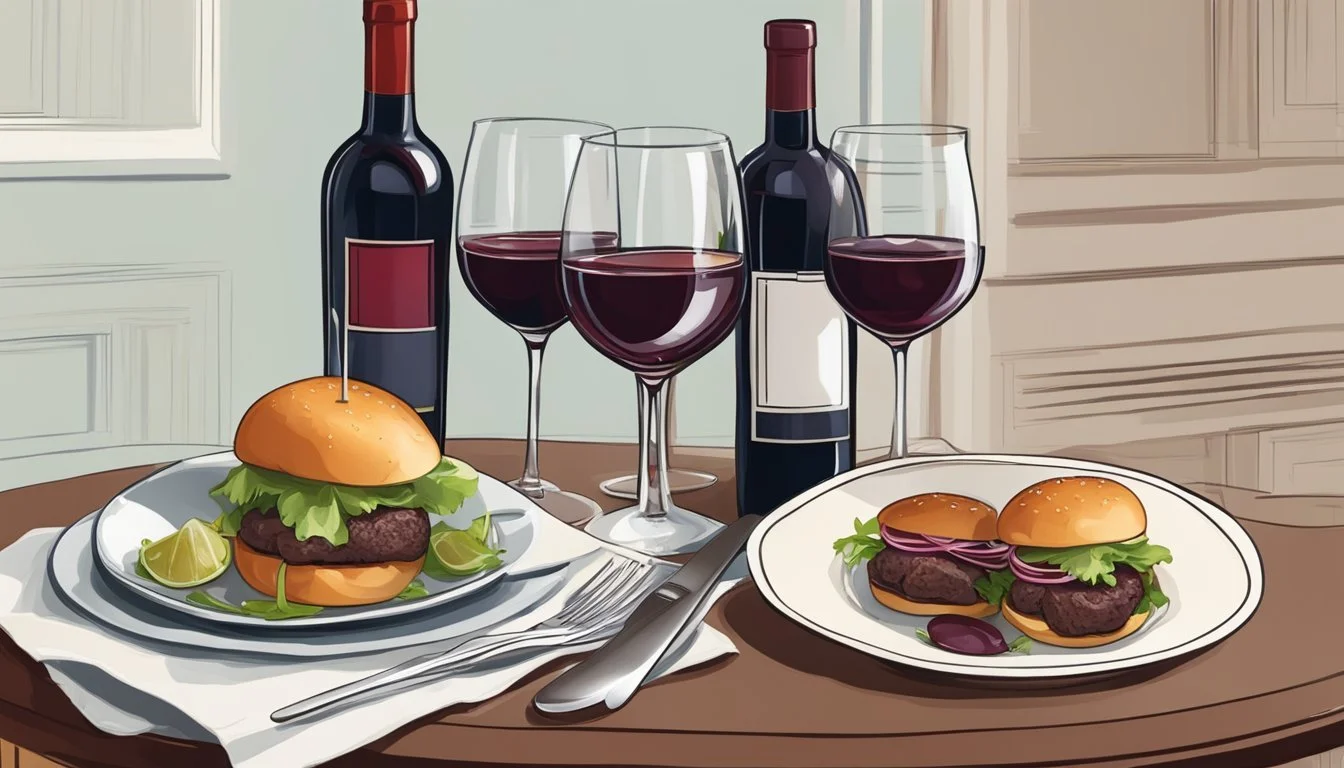What Wine Goes Well with Beef Sliders
Perfect Pairings Guide
The art of wine pairing takes on a casual yet sophisticated twist when it comes to accompanying beef sliders (What wine goes well with beef sliders?). These miniature burgers pack a flavorful punch and provide an excellent canvas for a variety of wines. The ideal wine pairing for beef sliders should complement their rich, savory flavors without overwhelming the palate.
Selecting the right wine to go with beef sliders involves considering the beef's juiciness and the toppings' unique flavors. Full-bodied red wines are often the go-to for beef dishes due to their ability to mesh well with the meat's natural flavors and the fat's tendency to soften the wine's tannins. However, the smaller size and often less intense flavor of sliders allow for a broader range of wine options, including lighter reds and even some white wines, depending on the slider's garnishes and sauces.
In selecting a wine to pair with beef sliders, one might consider a variety with enough structure and balance to cut through the richness of the meat while also bringing forward the subtle nuances of the chosen toppings, whether it be a classic cheese and pickle or a bolder blue cheese and bacon combination. The pairing should enhance the overall dining experience, elevating both the dish and the wine.
Understanding Wine and Food Pairings
When selecting a wine to accompany beef sliders, one must consider the interplay of flavor profiles, tannin structure, acidity, and the age of the wine to ensure a complementary pairing.
The Impact of Flavor Profiles
Beef sliders, characterized by their savory and often slightly smoky flavor, demand wines that can match their intensity without overwhelming the palate. Wines with robust flavor profiles, such as a Zinfandel or a Shiraz, are excellent choices as they can harmonize with the rich meatiness of the sliders. Key flavors such as black pepper, cherry, or even tobacco in the wine can enhance the taste experience of beef sliders.
The Role of Tannins and Acidity
Tannins are crucial in red wines, providing structure and a mouth-drying sensation that works particularly well with the fattiness of beef. A wine with moderate to high tannin content cleanses the palate after each bite, making each subsequent bite of slider as enjoyable as the first. Acidity in the wine, on the other hand, acts as a balancing agent for the fattiness and can bring out subtler flavor in the beef, especially if the sliders are topped with cheese or served with a tangy sauce.
The Importance of Age in Wine Selection
The age of the wine can significantly impact its compatibility with beef sliders. Younger wines tend to have more pronounced tannins and acidity, which can stand up to the rich flavors of the beef. However, an aged wine, with its tannins softened, might be preferable if the beef sliders are seasoned with more delicate herbs and spices, providing a more harmonious eating experience. Selecting a wine with the right age is vital to complement the texture and flavor nuances of the sliders.
Selecting the Perfect Wine for Beef
Choosing the right wine for beef can elevate a meal from good to extraordinary. Factors such as the cut of beef and its fat content play pivotal roles in selecting an ideal wine pairing.
Pairing Wine with Different Beef Cuts
Lean Cuts: For leaner beef such as filet mignon or sirloin, one might opt for lighter red wines that balance the meat without overwhelming it. Options include:
Pinot Noir: Offers a balance of fruit and earthiness.
Merlot: With its soft tannins, it complements without dominating.
Rich, Fatty Cuts: Intensely flavored beef cuts such as ribeye or burgers pair well with full-bodied wines:
Cabernet Sauvignon: Bold tannins match the richness of fattier beef.
Shiraz/Syrah: Its peppery notes enhance charred or grilled beef.
The Relationship Between Wine Body and Beef Fat
The body of a wine—light, medium, or full—is a key factor in pairing with beef's fat content. Wines with higher tannins are better suited to fattier beef since tannins cut through the richness, creating a balanced taste.
Light-Bodied Wines: Not ideal for fatty beef, but can complement lightly flavored, tender cuts.
Medium-Bodied Wines: Versatile with most beef dishes, particularly those with moderate fat.
Full-Bodied Wines: Best for high-fat content beef, as their robust structure stands up to the intense flavors.
Top Red Wines for Beef Sliders
Selecting the right red wine to pair with beef sliders can elevate this casual dish to a new level of enjoyment. The following subsections highlight specific red wines that complement the richness and flavors of beef sliders.
Cabernet Sauvignon and Its Complementary Flavors
Cabernet Sauvignon is a robust red wine favored for its ability to stand up to the richness of beef. With its full-bodied profile and tannin structure, it cuts through the slider's fat, enhancing the meat's savory flavors.
Merlot: A Versatile Choice for Sliders
Merlot offers a softer, more versatile pairing for beef sliders with its medium body and fruity notes. The moderate tannins of Merlot help to cleanse the palate, balancing out the flavors without overpowering the dish.
Syrah/Shiraz: Bold Flavors for Bold Meats
Syrah, also known as Shiraz, is well-suited for sliders due to its bold flavors and spicy undertones. This wine complements the natural umami of beef and harmonizes particularly well with any peppery or smoky notes in the seasoning.
Malbec: A Crowd-Pleaser with Beef
Malbec is known for its dark fruit flavors and smooth finish, which can be a crowd-pleasing choice for beef sliders. This wine's naturally rich character matches the depth of beef, making it a reliable option for a variety of tastes.
Zinfandel: A Bold Companion for Spiced Sliders
For those who enjoy a little extra spice on their sliders, Zinfandel can be the perfect companion. With its jammy fruitiness and a hint of spice, it stands up to bolder condiments and seasonings without overwhelming the beef's inherent flavors.
Exploring White and Rosé Wines with Beef
When it comes to beef sliders, the robust flavors of red wines are often recommended, yet white and rosé wines can offer a delightful contrast. These wines bring a balance of acidity and fruit that can complement the savory taste of beef, especially when the beef is prepared in a lighter style.
Chardonnay: A Surprising Pair for Lighter Beef Dishes
One might not immediately pair a Chardonnay with beef, due to its white grape characteristics, but a Chardonnay with subtle oak influence can harmonize well with lighter beef dishes. The key is to consider the preparation and seasoning of the beef:
Grilled beef sliders: Look for a Chardonnay with enough body and a slight buttery texture to stand up to the smokiness of the grill.
Braised beef: Choose a Chardonnay that showcases a balance of acidity and fruit profiles to complement the tenderness of the meat.
Rosé: Refreshing and Light for Summer Sliders
Rosé wines, with their vibrant acidity and fruit-forward nature, are an excellent choice for beef sliders served at summer gatherings. Their crispness cleanses the palate between bites, while their versatile flavor profile can adapt to various toppings and seasonings. Here's how to match a rosé with beef sliders:
Classic beef sliders: Opt for a dry, Provence-style rosé that pairs well with traditional, simple beef slider condiments.
Spicy beef sliders: Choose a rosé with a hint of sweetness to counterbalance the heat and elevate the spices used in the beef preparation.
By stepping out of the conventional pairing box, one can discover how a well-chosen Chardonnay or Rosé can provide a refreshing twist to the beloved beef slider experience.
Unique Regional Wines to Consider
When selecting wines to pair with beef sliders, considering the regional specialties can elevate the pairing experience. Certain wines have characteristics that can complement the rich flavors of beef, providing a delightful culinary balance.
Napa Valley Gems for Gourmet Burgers
Napa Valley's reputation for Cabernet Sauvignon is unmatched. Known for its full-bodied profile with bold tannins, it can hold up to the savory flavors of gourmet beef sliders. Wines such as a 2016 Napa Valley Cabernet can offer notes of dark fruits and spices.
Rioja and Tempranillo: Spanish Flair for Beef
The versatility of Rioja, made primarily from Tempranillo grapes in Spain's Rioja region, offers a spectrum from light to full-bodied bottles. A Crianza Rioja, with its cherry and vanilla notes, works well with the savoriness of beef, adding a Spanish touch to the meal.
Washington State Wines for American Classics
Merlot and Syrah blends from Washington State present bold flavors and smooth textures. Wines such as a robust 2018 Columbia Valley Syrah provide dark fruit notes and subtle hints of chocolate and spice, perfect for enhancing traditional American beef sliders.
Italian Favorites: Chianti and Barbera
Chianti, known for its acidity and subtle tannins, and Barbera wines from regions like Piedmont stand out with their fruit-driven flavors and earthy undertones. A classic Barbera d'Asti provides the perfect balance for sliders with its vibrant acidity and low tannin levels.
Complementary Food and Wine for a Full Meal
When assembling a full meal with beef sliders, pairing the right wine is crucial to complement the savory flavors of the beef, as well as the richness of cheese and the tang of sauces and condiments.
Cheese Pairings: Swiss and Cheddar
For sliders with Swiss cheese, the wine should balance its nutty and slightly sweet nature. A Pinot Noir with its fruity notes and medium body is an ideal match. Cheddar, with its sharper taste, calls for a bolder wine such as a Cabernet Sauvignon. This wine's firm tannins and dark fruit flavors can stand up to the strong character of cheddar.
Cheese Type Wine Recommendation Swiss Pinot Noir Cheddar Cabernet Sauvignon
Sauces and Condiments to Elevate the Experience
Beef sliders are often accompanied by various sauces and condiments, with classic options like ketchup and mustard or more gourmet varieties such as aioli or spicy relish. A versatile Zinfandel, known for its boldness and spicy profile, can complement the rich flavors without overwhelming them. For sliders drenched in gravy or served with gravy as a dipping sauce, a Syrah with peppery notes creates a harmonious dining experience.
Sauce/Condiment Type Wine Recommendation Ketchup/Mustard Zinfandel Gravy Syrah
Wine Alternatives for Non-Wine Drinkers
For those who prefer not to partake in wine, seeking an alternative beverage that complements the flavors of beef sliders is key. There are options that can harmonize with the savory qualities of the beef and the unique toppings of sliders.
Beer and Sliders: A Classic Combination
When it comes to beef sliders, a cold beer is often a top choice. The carbonation and variety of flavors available in beer make it an excellent counterpart to the richness of the beef and the possible spiciness of condiments.
Light Lagers are refreshing with a mild taste that won't overpower the sliders.
Amber Ales offer a balance of malt and hops which pairs nicely with the slightly fatty nature of the beef.
Porters or Stouts can be a delightful match if the sliders are particularly hearty or topped with bold, smoky flavors. (What wine goes well with smoky flavors?)
Choosing the right beer depends on both the seasoning of the sliders and personal preference. For a classic taste, they might opt for a light lager, whereas for a more robust flavor experience, a stout or porter would be more appropriate.
Expert Tips from Sommeliers
In the art of pairing wines with beef sliders, sommeliers can offer a wealth of nuanced advice. They focus not only on traditional taste profiles but also on personal taste and the offerings of a wine club.
How to Navigate a Wine Club Selection
When selecting a wine from a wine club to pair with beef sliders, one should consider the varietals on offer. Typically, a Syrah or Merlot could complement the savory flavors of the sliders. Sommeliers recommend looking for wines with a balance of fruitiness and acidity to cut through the richness of the beef. Wine clubs often have notes about the body, tannins, and flavor profiles, which can guide a member in making an educated choice.
Body: A medium to full-bodied wine can stand up to the hearty texture of the sliders.
Tannins: Look for moderate tannins that can help cleanse the palate.
Flavor Profile: Fruit-forward wines with a hint of spice bring out the best in beef sliders.
Developing Your Own Pairing Preferences
Sommeliers encourage individuals to develop their own pairing preferences through experimentation. One may start with classic combinations and then venture into more adventurous territory. If a beef slider features blue cheese, a wine with a slight sweetness, like a Zinfandel, could complement the bold flavors, while a tangy cheddar slider might pair well with a dryer red.
Some points to consider include:
Personal Taste: One’s own palate should be the ultimate guide.
Components of the Slider: The specifics of the toppings and sauces can greatly influence the choice of wine.
Occasion: Whether it’s a casual gathering or a formal event may dictate a different approach to the pairing.
The Finer Points of Hosting with Beef and Wine
When hosting an event that features beef sliders and other beef appetizers, selecting the right wine is crucial for enhancing the flavors and creating a memorable experience. Careful pairing can transform a simple gathering into a gourmet event.
Pairing Wines with an Assortment of Beef Appetizers
Beef Sliders: For beef sliders, a medium-bodied red wine such as Merlot or a Grenache blend provides enough structure to complement the savory meat without overwhelming it. The fruit-forward notes of these wines balance the richness of the beef.
Wings: With spicy beef wings, one may opt for a Zinfandel with its bold fruit and spice to match the intensity of the wings.
Meatballs: For saucy and rich beef meatballs (What wine goes well with beef meatballs?), a Chianti is ideal, as its acidity cuts through the richness while aligning with the herb-infused flavors.
Deli Meat: An array of deli meats such as roast beef calls for a versatile Pinot Noir, which has enough subtlety to mesh with various seasonings and preparations.
Creating a Memorable Burger and Wine Event
A burger and wine event can leave a lasting impression with the right pairings. Guests often remember the thoughtfulness that goes into matching the bold flavors of burgers with a suitable wine.
Table Setup: Arrange burgers and wines in a tasting format, allowing guests to sample different combinations. Use placards to suggest pairings, guiding them through the flavors.
Burger and Wine Pairing:
Classic Beef Burger: Pair with a Cabernet Sauvignon; its tannins cut nicely through the fat and complement the char.
Cheeseburger: Try an old-vine Zinfandel; its depth handles the cheese's creaminess and the burger's savoriness.
BBQ Burger: Opt for a Syrah/Shiraz, where smoky notes meet the BBQ sauce's sweet and tangy flavor.
Informative Labels: Equip your wine bottles with labels that explain the characteristics of each wine, including notes that pair well with specific beef dishes. This educates guests and enhances their appreciation of the pairings.








